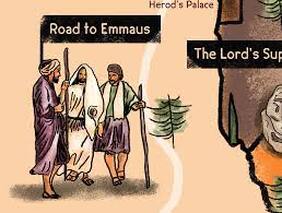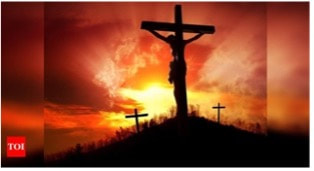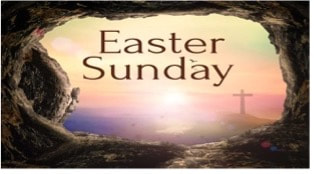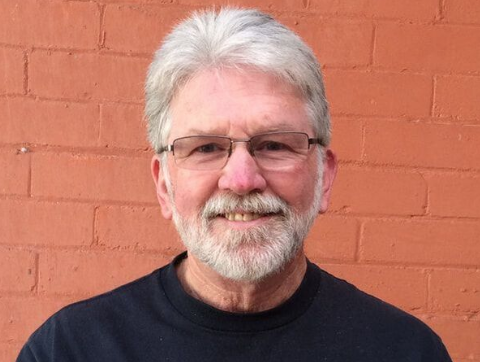Reflection: "God - the Loving Shepherd"This Sunday is sometimes facetiously called "Sheep Sunday" by irreverent preachers, because on this Sunday, every year, the lessons are similar to the scriptures we read this week.
This week’s Gospel reading gives us John's description of Jesus, the Good Shepherd and the Psalmist's song: "The Lord Is My Shepherd" gives us a sense of security. So, I wondered, as I read these words, why sheep? Why not eagles? I can picture us as eagles, soaring high up in a gorgeous blue sky, instead of being in a mob of daggy sheep, wandering aimlessly in some dusty paddock in the outback. The prophet Isaiah writes ... "They who wait for the Lord shall renew their strength. They shall mount up with wings like eagles, they shall run and not be weary, they shall walk and not faint" (Isaiah 40:31). That’s more like it. That's what I’d like to read on a plaque on my office wall. Why not call ourselves “eagles”? Why do we have to be sheep? But then, I have to be honest with myself - and think that maybe it's because our prayer of confession got it right when it says: "... we have erred and strayed from God's ways like lost sheep. Too often we’ve followed the devices and desires of our own hearts ..." and so on and so forth. We seldom soar, like eagles, but all too often we act like sheep. I’m sure that at times we’ve all erred and we’ve all strayed – just like lost sheep. I know that and you know that. And the Bible tells us that, using it as a metaphor for the reality of our lives. Lives we live together in our families, at our work, in our community, in the church - every day. It’s interesting that the sheep metaphor finds its meaning in the fact that sheep are communal, by their very nature and we don’t even have a different singular word for one sheep. The term is always understood to be both singular and plural, as in: one sheep and a flock of sheep. I'm a bit sceptical of anyone who writes about the love of God for his "sheep," and how to cook lamb chops, in the same book. But maybe Jeff Smith’s book “The Frugal Gourmet Keeps the Feast: Past, Present, and Future”, has it right. Jeff, who also happens to be a Methodist minister, as well as a good cook, says the meaning of the metaphor is simply that you and I together, like sheep - plural - are a community, a flock of faith in which we are cared for by God, as the shepherd who cares for sheep, and that's what God intends. We're in it together, and together we’re shepherded by our Lord and Saviour, Jesus Christ. That's a good corrective to the excessive individualism of our day, that leaves so many of us feeling very much alone, even when we’re in the presence of our God. More like a sheep at the mercy of a predator, than a lamb in God's arms of protection. Protection provided in Jesus' story by the sheep being together in the sheepfold - not just in his willingness to go out into the wild to find them. The nineteenth century Princeton theologian, Benjamin Breckinridge Warfield, whose work was to have great influence on the original "Fundamentalists," apparently considered this to be fundamental: "That in Jesus Christ, God was 'saving the world and not merely one individual here and there out of the world.' " That in Jesus Christ, God came as a shepherd, to his sheep”. And we can see that the language in John's gospel is reminiscent of the 23rd Psalm. What is eloquently sung there about the Lord's care, guidance, and protection of the flock is here, in John, reaffirmed in terms of Jesus. I did a little research and found a book called “Approved Practices in Sheep Production”, which says that in caring for sheep, and I quote: "Most important is that ...continuous attention (is) required. Sheep are often quite helpless and fall easy prey to predators, especially dogs, coyotes, foxes, bobcats, and eagles. They might even fall prey to such hazards as wire fences, or to ditches and gullies in which they might lie and suffocate unless aid came quickly. Parasites and disease are also ever-present problems to guard against." The book says sheep have a lot of problems - well, so do we! The book says sheep face a lot of dangers - and so do we! The book says sheep are best tended together and so are we, says the very clever book we call the Bible - with its image of God as our shepherd. But what about us? The image of the sheepfold and us as the sheep, is not intended to make us feel sheepish, dumb, or individually unimportant. Rather, it’s intended to reinforce the importance of all of us, to the shepherd. The sheepfold, then, whilst constraining and confining and sometimes crowded, is not claustrophobic. Rather, like with children, the setting of boundaries gives us security, by knowing how far we can stray, and being aware of the dangers of going outside of the boundaries. It frees us to live life as God intends: to live each day to the fullest - just what Jesus meant when he said, "I came that they might have life, and have it abundantly" (John 10:10 NRSV). In our world, where the closest most of us will ever get to a sheep is in a book, or on TV, or by touching the wool in our suits, skirts, slacks, or socks, we still need a shepherd, who will lead us and guide us and occasionally prod us to show us the way we should go. And the good shepherd, who gives his life for the life of the sheep, for your life and mine - that we might live and have life abundantly, is Jesus Christ. Aren’t we blessed! Are YOU feeling blessed today? It’s often said that we are blessed to be a blessing and that means that we should use all the love and grace that God has given us to go out into our world and share that love with others. Let them know that God wants to have a personal relationship with them, too. Then, we need to let the Holy Spirit work on them to bring them around. Do your bit and plant the mustard seed, knowing that it will be watered and nurtured, with the help of the Holy Spirit, so that it, too, will grow into a mighty tree. Think about that, as you go about your daily business next week, next month, next year and then do your best to take advantage of the opportunities to witness, which God puts in front of you. Pastor Rick
1 Comment
Reflection: "New Life" It’s hard to understand how two faithful disciples of Jesus could have travelled with him, side by side, mile after mile, without recognizing him.
Maybe disappointment had blinded their eyes and hearts to the truth. In Jerusalem, the pilgrims had learned the devastating news about the death of Jesus. Despite having heard stories about the women and some of the other disciples reporting that Jesus was still alive, they continued to focus on his death, as they had hoped that he was going to be the one to bring redemption to the oppressed and subjugated people of Israel. But, at this point in time, Cleopas and his friend had concluded that he was not the one. They didn’t understand how he could now be alive, or how the transformation of life Jesus had begun, could continue. For them it was still Good Friday, and so they left for home. But their experience along the road and at dinner in Emmaus, changed their sorrow to joy and hope. When the pilgrims heard Jesus blessing the bread for the meal and saw him break it and give it to them, they suddenly began to understand. And as they recalled the glory of Jesus in his last days, remembering the insights they had gained on the road, when Jesus had recalled for them the great stories of Israel’s past and compared them with himself, their understanding deepened. These actions provided a telling insight into the reality they had earlier missed. Although Jesus then disappeared from their sight, they now knew they had experienced the presence of the resurrected Jesus. By living out their disappointments, while somehow remaining open to what seemed impossible, they discovered for themselves that what the women at the tomb had witnessed, was actually true. Luke’s story about the disciples on the road to Emmaus is also very instructive for us in current times. Like the disciples in this account, we, too, can miss the resurrected Jesus in our midst. And, like them, we can use our experience in recalling the deeper truths of scripture to transform our lives. For example, our experiences in church on Sunday mornings and at other times in worship, help us to repeat again and again the story of the disciples on the road to Emmaus. We recall the scriptures and place them in the extraordinary context of Jesus, our Christ and we recall his powerful moment at the Last Supper, when he gave his closest followers bread and wine, his body and blood, to provide nourishment and meaning and direction for having a fulfilled life. For us, in so recalling, we’re there on the road with Cleopas and his friend. In so recalling, we’re there with the disciples at the Last Supper. Instead of experiencing stress after the trauma of having our Lord killed, we recall and relive the most glorious reality of knowing the resurrected Jesus and feel that we are now as much in the presence of God as were the disciples of olden days. You might remember, from last week’s message, I pointed out that we didn’t have to have been there with the disciples, to believe in the risen Lord. Because we have faith, we know that the stories we hear from the bible are real and meant for us. From today’s gospel account we experience two examples of reliving the resurrected Jesus. Both are critically important, and they are: word and sacrament. They help us to recall who and what we are, as followers of Christ, no less “in the story” than were the two men on the road to Emmaus. On our journeys of faith, we find truth in action, living out the reality of bringing Jesus into our presence. Again and again, like the disciples on the road to Emmaus, we can overcome our discouragement, our sense of being lost, and we can go to where the re-birthed action lies. The resurrected Jesus shows us that the forces of evil and destruction won’t prevail over the power of love. Again and again, we recall that we are the body of Christ – and so in our lives, in our actions and in our words, we can reach others, helping them understand the presence of the resurrected Jesus. As Jesus did with the bread and wine, making it into his body and blood, God in our midst empowers us to discover, in the ordinary, what is truly holy. The encounter of two disciples with the resurrected Jesus came in the commonest, most familiar of ways. They came to know him walking and talking on a road, sitting down with him to eat and pray. We are able to encounter him in common, familiar ways. The resurrected Jesus is with us, available to us, within us – always, as we live our daily lives. When Cleopas and his companion began to realize that they had experienced the resurrected Jesus, they recognized that their hearts had been burning as he talked and taught them on the road. They responded to their experience by going back to Jerusalem to tell the others what they had seen. Can we also recognize the resurrected Jesus in the experiences of our lives, feeling our hearts burning? Yes, when we open our hearts and our minds, the action of our lives, to the challenge of the resurrected Jesus, in order to live out in our time what he lived and died to prove. We should then be open to using the life-giving force of renewal and newness to tell the gospel story. When we encounter the resurrected Jesus in our midst, will we respond in joy and faith and commitment, as did the two men on the road to Emmaus? Will we respond by moving from where we are, renewed by the resurrected Jesus and ready to meet the world head on, ready to face the risk and change that his presence allows? The disciples discovered on the road to Emmaus that Jesus could be, and was, alive again, that God’s work, which was begun in him, could go on forever among his followers. Let us pray too that we can become like them, so that our hearts will burn with the desire to use the power of the resurrected Jesus. Will we use this burning as a light to recognize that God loves us and use it to help us reveal God’s love to others, continuing his ministry through our acts of compassion and caring to help heal a broken world? I trust that your answers to these questions will be “yes”, and that you will take positive steps to working out what direction your “new life” in Christ will take. As Nicodemus learned many years earlier, when he questioned Jesus about how we could have “new life”, we don’t have to return to our mother’s womb and be physically born again. Spiritual rebirth can occur at any stage of our life, and it may just be that today will be your “rebirth” day. I pray that, if it is, you will have a long and happy life in your journey with the risen Lord and you may encounter many days when your faith is refreshed along the journey of your life. Pastor Rick Reflection: "The Peace of God"“Shalom” says Jesus to his disciples when he appears before them on that day, just after his resurrection. Shalom roughly translates to “Peace be with you.”
Now, peace was probably the last thing the disciples were thinking about at that stage. After all, they’d just been on a huge roller coaster ride which included: the triumphal entry of Jesus into Jerusalem only a week before, the changing of the traditional Passover Meal into the sacrament of communion, the traitorous actions of Judas Iscariot - one of their own, the arrest of Jesus in the garden of Gethsemane, his trial and crucifixion, death and burial the empty tomb……. and now, his rising from the dead and appearing before them. Surely, they would have been really confused and scared, not knowing where to turn, or what to do. Therefore, peace was EXACTLY what they DID need. To top it off, Jesus tells them that he’s sending them out into the world with something called “the Holy Spirit” to guide and protect them, so all was coming to a fulfilment. Jesus had assured them earlier that he would bring them comfort and joy (John 17:12-13). He would give them an advocate, "the Spirit of truth who comes from the Father" (John 15:26). And with that Spirit, he would send them into the world to continue the work and spread the message so, in the words he used when praying to his Father, "that the world may know that you have sent me and have loved them even as you have loved me" (John 17:23). Now, in their presence, Jesus breathed on them, and they were touched by the Holy Spirit. At the time of the appearance of Jesus, after his resurrection, the disciples were a closed, inward-looking group, but he turned them into an open team of missionaries, sent out into the world. Could this be the time that we acknowledge as the birth of the Christian Church? The time when a body of believers first met and were told that their mission was to go into all the world and spread the good news, the Gospel of Jesus Christ. The disciples were told to go out and forgive people’s sins, just as Jesus had forgiven sins when he was in his 3 years of ministry around Galilee and Jerusalem. Would they be able to do the same work as Jesus had done during his ministry on earth? Would it work, or would the people just scoff at them, or worse still, stone them for blasphemy? Speaking of scoffers, there were, and still are today, those who wouldn’t believe that Jesus and died and risen from the grave after 3 days. In fact, even one of the 12, Thomas, refuses to believe that Jesus is alive, as he wasn’t in the room when Jesus first appears to the disciples. And he said: “Unless I see the nail marks in his hands and put my finger where the nails were, and put my hand into his side, I will not believe.” Not an unreasonable assertion, given the circumstances and one that you and I would probably make too. Even the disciples seem unable to recognise Jesus the first time he appears before them. It wasn’t until he shows them his hands and side that they recognise him. Does that make Thomas a “doubter” - or a realist? He had seen Jesus nailed to the cross and he saw him die, so, you really can't blame him for wanting a real encounter with a truly risen Lord, just like the other disciples had encountered. When you read through the resurrection accounts of all four gospels, you quickly realise that Thomas is not alone in his doubt - in fact, doubt isn't the exception, but the rule. No one - even after all the predictions - no one says, "Welcome back Jesus. We knew you would do it." No! – no-one anticipates the return of Jesus and when he shows up, everyone doubts. To make sure that he includes all of his closest followers, Jesus appears a week later, in the same room”. Jesus doesn’t chide Thomas as he allows him to put his fingers in the nail holes and his hand in the gash made by the centurion’s spear. It is then that Thomas utters the words “My Lord and my God!”, recognising Jesus for who he is. Jesus then says: “Because you have seen me, you have believed; blessed are those who have not seen and yet have believed.” Isn’t that what “faith” is all about? I mean, we weren’t there 2,000 years ago, yet we believe that the events occurred and were faithfully recorded and passed down through the ages. Like Thomas, we’d like to be able to have some physical signs of God’s presence. But, instead, we must rely on our faith and be part of the greater number of people who “have not seen and yet believe”. So, to all the scoffers, I say that there must have been a cataclysmic event that changed the scared, hiding disciples, into bold advocates for the Gospel – the good news about Jesus. I believe that it was this meeting with the risen Jesus, and the receiving of the Holy Spirit, that gave them the courage to go out there. Most of them ended up being killed for the words they spoke. Would they have done that if the Easter message had finished on Good Friday, with their leader being crucified? I think not. From the immortal poetic words with which John opens his gospel “In the beginning was the word and the Word was with God and the Word WAS God” - sending the reader back to the "big bang" of the creation of the universe, to this final intimate moment of comfort and assurance, with the risen Jesus, John wants us to know that we didn’t have to be there in person and walk the paths in Galilee with Jesus. We didn’t have to witness the miracles first hand. We didn’t have to be in that closed room. Through the reading of John's message, and others like it, we can hear the stories and believe. And, in believing, we can have life eternal. I like to think of us as Resurrection people - that is - people who don't need to have it all figured out before coming to church, or helping a neighbour, feeding someone who is hungry, or caring for someone in need. If we have to figure it all out ahead of time, then we'll probably never get started. There’s so much hurt in the world - does the hand we extend, or listening ear we offer, really change that? I believe they do, but I, like you, at times wonder…..and have doubts. And yet, because we are Resurrection people, we believe, as well as doubt, and in believing, even in this more fragile way, we act, we reach out, we feed, we care, we tend, we struggle, we work, we love, all without any guarantees that what we do will have any impact, just a promise from the Lord who continues to bless those who believe amid their doubts and keep the faith, amid all their uncertainties. John 14:27 tells us that Jesus brings us peace. Not the sort of earthly peace that we’re used to, but the eternal peace that only he can give. He tells us not to be afraid, he has gone to be with God and we should rejoice. So, can you remember the last time when Jesus brought peace to you? Close your eyes now for a short time and see if you can feel the peace of God flowing over you. Pastor Rick Reflection: "Easter"Easter can be a difficult time for some people.
It’s hard to feel God’s loving presence when Jesus is being torn apart by pain, grief and disaster. It must also have been incredibly difficult for Jesus and his followers to feel God’s loving presence that first Easter. So why do we call the day of Jesus’ death “Good Friday”? Maybe it’s about God’s love coming into the toughest parts of our world and transforming it with his life and love. But is it the cross itself that we’re remembering, or the suffering that Jesus went through on our behalf? We know that Jesus had committed no crime and was blemish free. He’d been tempted by the devil but had resisted - and even turned the tables on him. Yet he endured anguish and suffering – all on our behalf. We sometimes wonder why Jesus had to die in such a horrible way. The disciples, despite being told by Jesus what was going to happen, were devastated when he was killed. Their hopes and dreams had been shattered and they wondered how they could continue without their leader. They were in hiding – fearing that the religious leaders would persecute them, too. Was the Christian movement about to splutter out and end on that Easter Friday, so long ago? They couldn’t believe that the son of God could be defeated so easily by the Romans and the Jewish Chief Priests. In John 19:30 we hear the last recorded words of Jesus before he gave up his life on the cross: “It is finished.” But Jesus wasn’t admitting that he’d been defeated by the religious leaders. Instead, his words could be better translated as: “It is completed.” Or, looking at it another way, what he had come to do on earth, had been achieved. Even the seeming ignominy of dying on a Roman torture device. Because he defeated death, it no longer has power over us. Let’s take a closer look at that death. Did the religious leaders really get the better of Jesus? No, that was part of God’s overall plan. In John Ch. 10 we see Jesus asserting that no one will take his life away from him. Instead, he will gladly lay down his life for others. So, John reports Jesus saying that no one will kill him, but instead, he will LET himself be killed, to make a point. And that point becomes all too clear once Easter Sunday’s story unfolds. Think about what it would have been like in Jerusalem on that first Easter Sunday morning. One of the disciples runs in breathlessly to meet the others, who were hiding away, fearful for their lives, following the death of their master, a few days earlier. “Hey. Have you heard the good news? He’s alive! The master’s alive! The tomb’s empty and he’s risen from the dead. Let’s go and tell the others.” I guess that’s how the disciples would have reacted on that Easter Morning, after they had gone to visit his tomb, only to find that the stone, which had been blocking the entrance, was rolled away and the tomb was now empty. Instead of finding the dead body of their Lord, they found two angels outside the tomb, who asked the women why they were looking for the living among the dead? The disciples, however, were still a bit unsure and some, like Thomas, even refused to believe the words unless he saw Jesus himself - touched his body - and put his fingers in the nail holes. Only a few days earlier, on that first Good Friday, the world of the believers had come to a shattering standstill. Their Lord and Master had been killed – crucified by the Romans - at the insistence of the Jewish High Priests, who were jealous and afraid of the popularity that Jesus had achieved with the common people. The Son of Man may have allowed himself to be killed, but he astounded everyone, including his closest friends and followers, by rising from the grave on the third day, just as had been prophesied in the old scriptures and had, indeed, been retold by Jesus when teaching his disciples. But he wasn’t an apparition, a ghost, as many must have thought. He even ate and drank with his disciples and let them touch his body, to see that he was really there. And he didn’t just disappear on that day, never to be seen again. He was observed on many occasions, by many followers, over the next 40 days - before he ascended into heaven to be with his Father. Oh yes, there were sceptics and scoffers then and there still are - even today - who say that it was all a big confidence trick. That he never really died. But think about it for a minute - and this is the thing that really convinces me of the truth of what was written in the gospels about the death and resurrection of Jesus. Remember how his followers had hidden themselves after the crucifixion and were afraid for their lives? They were terrified that the religious authorities would come after them – to stamp out any remnants of the followers of Jesus, who had called himself the Messiah, the Christ, the Son of God. But following his resurrection, after they had actually seen him, seen the nail holes in his hands and feet, and the gash in his side, then and only then, did they become brave. Brave enough to publicly proclaim him, and his message of love, to anyone who’d listen. And not only in Jerusalem, or even Galilee, but throughout the known world. Apostles like Peter, Paul, Andrew and John travelled widely and preached the gospel – about how God loved everyone, not just the Jews, and that he wanted to be in a relationship with them. The apostles were so sure of what they were doing, that they were prepared to die, rather than deny Jesus. And in most cases, they WERE killed, sometimes very violently. That’s still happening today, as we hear, all too often, about persecuted Christians in many countries preferring to be killed, rather than to renounce their faith. You know, the gospel didn’t finish with the martyred apostles, or those who’ve given their lives over the years. It’s grown and spread around the world to a point where billions of people have heard it and believed. These are ordinary people, like you and me. So, what should we do with this knowledge? Should we just keep it to ourselves and feel all warm and fuzzy inside? Or should we, too, go out into all the world and let others also share in the Gospel - the good news about Jesus? Would you like to take part in the proclaiming of God’s Kingdom here on earth? I won’t deceive you - it’s not an easy task, but we’re much luckier here in Australia, as we can proclaim the gospel without fear of persecution. That’s not always the case outside of our great country. Surely, each and every one of us can do Something to make this story known to others outside the Christian faith. Search inside yourself, talk to God in prayer, and see what you can do – today, tomorrow, and for every day of the rest of your life. He is risen! He is risen indeed! Easter blessings……..Pastor Rick |
Pastor
|
LANE COVE
|
Worship Service:9:30am Sunday
© Lane Cove Uniting Church | 2020
|






 RSS Feed
RSS Feed